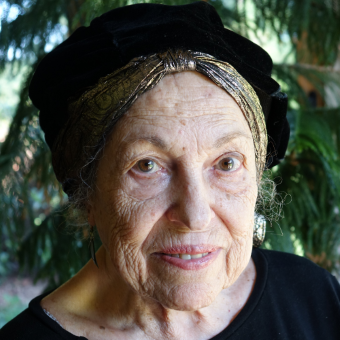Blog Archive: 2020
2020
December 1, 2020
By Susan Nashman Fraiman
Researching a lost work of art is like solving a mystery — and, as is often the case, sometimes the mystery is only partially unraveled, while threads of other mysteries are discovered. "The Lost Portrait of Gutle Rothschild," an article about a painting by Moritz Oppenheim (published online in Judaica. Neue Digitale Folge) began as a serious project while I was an HBI Research Associate in 2012-13. This painting has only survived in a black-and-white photograph taken in Germany in the 1930s.
November 11, 2020
Rivka Cohen and Naima Hirsch's journey from Orthodox girlhoods where they grew up without discussing bodies and sexuality to editors of a successful book modeled after the Vagina Monologues runs straight through Brandeis. In October, HBI hosted these young women, along with Alona Weimer, (Brandeis ’18) and Jordyn Kaufman, two of the many contributors to "Monologues from the Makom: Intertwined Narratives of Sexuality, Gender, Body Image, and Jewish Identity" as they read some of the poetry and prose in their book.

Lisa Joffe
October 13, 2020
By Lisa Fishbayn Joffe
HBI is proud to be a sponsor of Jewish Women Vote, a program to encourage Jewish women to use the franchise that generations of Jewish women have fought hard to secure for themselves and others; and part of the VoteDeis Campus Coalition, a nonpartisan Brandeis coalition supporting voter registration and voting.
September 30, 2020
By Wendy Amsellem and Mike Moskowitz
This is the week in the Jewish calendar when we shift focus from repentance and introspection into the world of action. We move from the preparations and reflections of Elul, and the fasting and praying on Yom Kippur, to the immediate building of our sukkot. We try hard to live up to the ideals of our newly penitent selves and to persevere in the goals we have recently set. One of the best ways to prevent falling into old patterns and habits is to step away from our familiar structures and systems, and to reposition ourselves anew in the sukkah.

Lisa Joffe
September 16, 2020
By Lisa Fishbayn Joffe
As we head into a new academic year and a new year on the Jewish calendar, HBI wishes you a year of good health, warm relationships and meaningful engagement with stimulating new ideas Through these last difficult months, HBI has created new ways to connect and support scholarship at the intersection of Jewish Studies and Gender Studies by taking our programs online.

Marcia Falk
September 8, 2020
On Wednesday, Sept. 23, Marcia Falk will discuss and read from her book, "The Days Between: Blessings, Poems, and Directions of the Heart for the Jewish High Holiday Season," published in the HBI Series on Jewish Women. The session is designed for those seeking to connect more deeply with their Judaism, and for all those in search of a contemplative approach to these challenging times.
July 28, 2020
By Jonathan Branfman
They crack us up, they make us proud, and sometimes they embarrass us: the neurotic Jewish men and domineering Jewish women of American TV evoke complicated feelings for many Jews. From lovably bawdy Jewish women like Fran Drescher and Tiffany Haddish to castrating terrors like Debbie Wolowitz , from cute "nice Jewish boys" like Seth Rogen to emasculated losers like George Costanza;, these TV Jews shape how non-Jewish Americans view Jews, and how Jews view ourselves.
July 17, 2020
By Aliyah Blattner
Shterna Goldbloom, the Hadassah-Brandeis Institute's featured artist, recently met with this year’s cohort of Gilda Slifka interns to host her virtual workshop "Self(ie) in Isolation." As we framed shot after shot, complete with fabulous costume changes and eclectic camera angles, Goldbloom spoke to us about the concept of multiple selves, one of the themes of her current exhibit "Ich Bin Di Sitra Achra (I Am the Other)" which is on display at HBI's Kniznick Gallery and available online.
July 1, 2020
Every summer, HBI welcomes interns from across the country and world who complete original research related to the HBI mission of fresh thinking about Jews and gender worldwide and support the work of scholars affiliated with HBI and Brandeis. During the eight-week program, the interns also attend educational lunch sessions with scholars, visit Jewish sites of interest in the Greater Boston area including Mayyim Hayyim, and a walking tour of Jewish Boston. The Gilda Slifka HBI Summer Internship is supported by a generous gift from Gilda Slifka.

Tally Kritzman-Amir
June 15, 2020
By Tally Kritzman-Amir
As an Israeli feminist scholar and activist, I read the news about the Coronavirus thinking about the experience of women. Much of what is written about women in the Coronavirus era is obvious to anyone who is interested in gender disparities. Women are more susceptible to overburdening by unpaid or underpaid care jobs, household responsibilities, and children. They risk over-working and paying a toll in terms of their health or mental stability, or losing their paid jobs as they try to balance other responsibilities.
May 26, 2020
By Rabbis Wendy Amsellem and Mike Moskowitz
Chen is sometimes hard to describe but we know it when we see it. It is that extra measure of grace that makes a person or an action especially appealing. Chen elevates the ordinary, exceeds our expectations, and inspires us to be more graceful as well. It is perhaps because grace transcends the natural limitations that it is so difficult to articulate and achieve.
May 7, 2020
By Moria Ran Ben Hai
"They closed shul for minyan, I can't go to Seder, but guess where I can go? The mikvah! What does that mean? Where do I stand in terms of the value of my life in rabbinic and halachic authority?" asked Ariele Mortkowitz moderator of the "Online Panel Discussion: mikvah and COVID-19" in April 2020. Mortkowitz, founding director of the "SVIVAH" community of Jewish women, raised that loaded question at the end of the panel as a way of asking the more important question.

Helène Aylon
April 21, 2020
By Amy Powell
HBI mourns the passing of Helène Aylon, the internationally-acclaimed Jewish feminist artist who died April 6, due to complications from COVID-19. She was a member of HBI's Academic Advisory Committee, exhibited twice in HBI's Kniznick Gallery and contributed to the permanent collection housed at HBI and the Women's Studies Research Center. In 2012, HBI published her memoir, "Whatever Is Contained Must Be Released: My Jewish Orthodox Girlhood, My Life as a Feminist Artist" (Feminist Press, The Reuben/Rifkin Jewish Women Writers Series).

Amy Powell
April 3, 2020
By Amy Powell
The question, "how is this night different from all other nights?" takes on brand new meaning this Passover; nearly everything about this seder will be different from all other seders. Rather than celebrating our Exodus among friends, family — and even potentially strangers as the Haggadah encourages us to "let all who are hungry come and eat," this year we are encouraged to celebrate alone.

Lisa Joffe
March 9, 2020
By Lisa Fishbayn Joffe
A recent case in England relies on a new legal strategy, using laws designed to protect victims of domestic violence to address the agunah problem and shows promise in bringing the law of the state to bear on behalf of women. Today, International Agunah Day(#gettfreedom) and the Fast of Esther, is a time for the community to reflect and act in solidarity with women placed in legal and social limbo by Jewish laws of divorce.
March 9, 2020
By Rabbi Wendy Amsellem and Rabbi Mike Moskowitz
In this election season, there has been a focus on whether candidates, especially female candidates, are sufficiently likeable. Likeability is a virtue as it indicates whether a candidate is attuned to others and can get them on board to work with them. Likeability can even be translated as חן, an ability to be found gracious by others. Esther, a heroine of the holiday of Purim (March 10), is the queen of likeability.

Esther Brownsmith
February 28, 2020
By Esther Brownsmith
Most people, when they read 2 Samuel 13, are horrified by its tragic contents. Amnon, the firstborn son of King David, falls in love with his half-sister Tamar. He devises a plan to get her alone, then despite her vocal protests, he rapes her. Afterwards, he brutally rejects her and throws her out. The story is tragic from start to finish — and it sparks a widening spiral of bloody revenge. In short, when most people read 2 Samuel 13, they are not reading it as a recipe. But I am.

Tally Kritzman-Amir
February 18, 2020
By Tally Kritzman-Amir
On Feb. 9, 2020, The Israeli Supreme Court published a ground-breaking decision in the field of legal feminism and the rights of asylum seekers in Israel. For the first time, the Court recognized applicants as meeting the definition of refugee and instructed the Population and Immigration Authority (PIA) to provide them protection as such. The applicants were applying for refugee status because they feared that their daughters, if returned to their country of origin, will be forced to undergo female genital mutilation (FGM).

Samantha Pickette
February 3, 2020
By Samantha Pickette
The CW Network' "Crazy Ex-Girlfriend" finished its final season last spring. Throughout its four seasons, the series — a hybrid musical/romantic comedy that plays with and satirizes the tropes of both genres — has been lauded for its progressive discussion of mental health, gender and politics.

Shulamit Magnus
January 14, 2020
By Shulamit S. Magnus
This is Part II of a blog about the aguna issue. It shows that approaches currently in use have long been tried and have failed to solve the problem, and proposes solutions that would free current agunot and end iggun. Part I discussed the underpinnings of iggun in halakha and some of the politics around the failure to end it.

Shulamit Magnus
January 7, 2020
By Shulamit S. Magnus
This is Part I of an article that outlines the history and proposed solutions to the aguna problem. Part II will show how the proposed solutions to date exacerbate the problem of unilateral, exclusive male power in this domain. Take a look at the Boston Agunah Taskforce for more information on Get refusal.